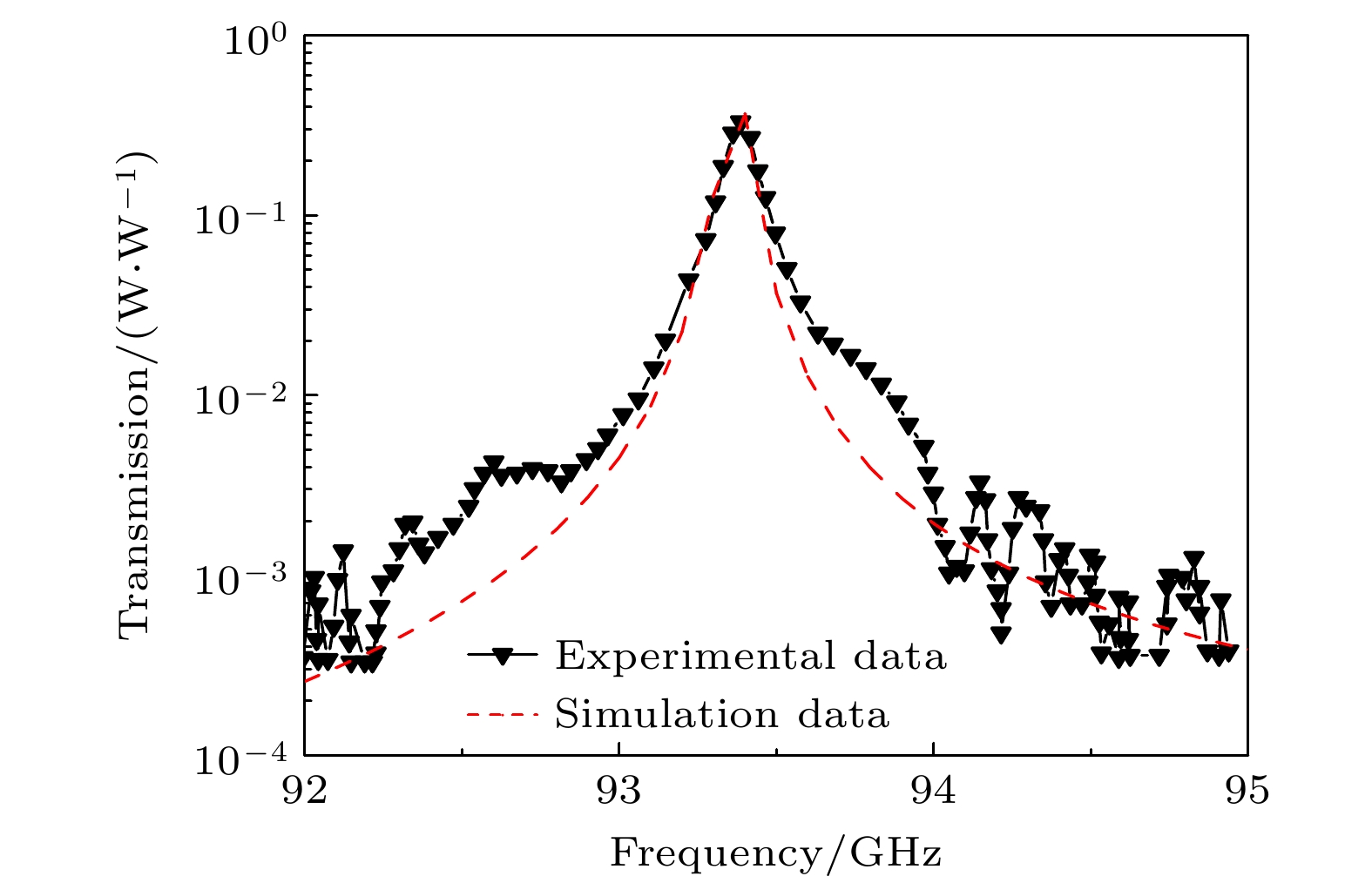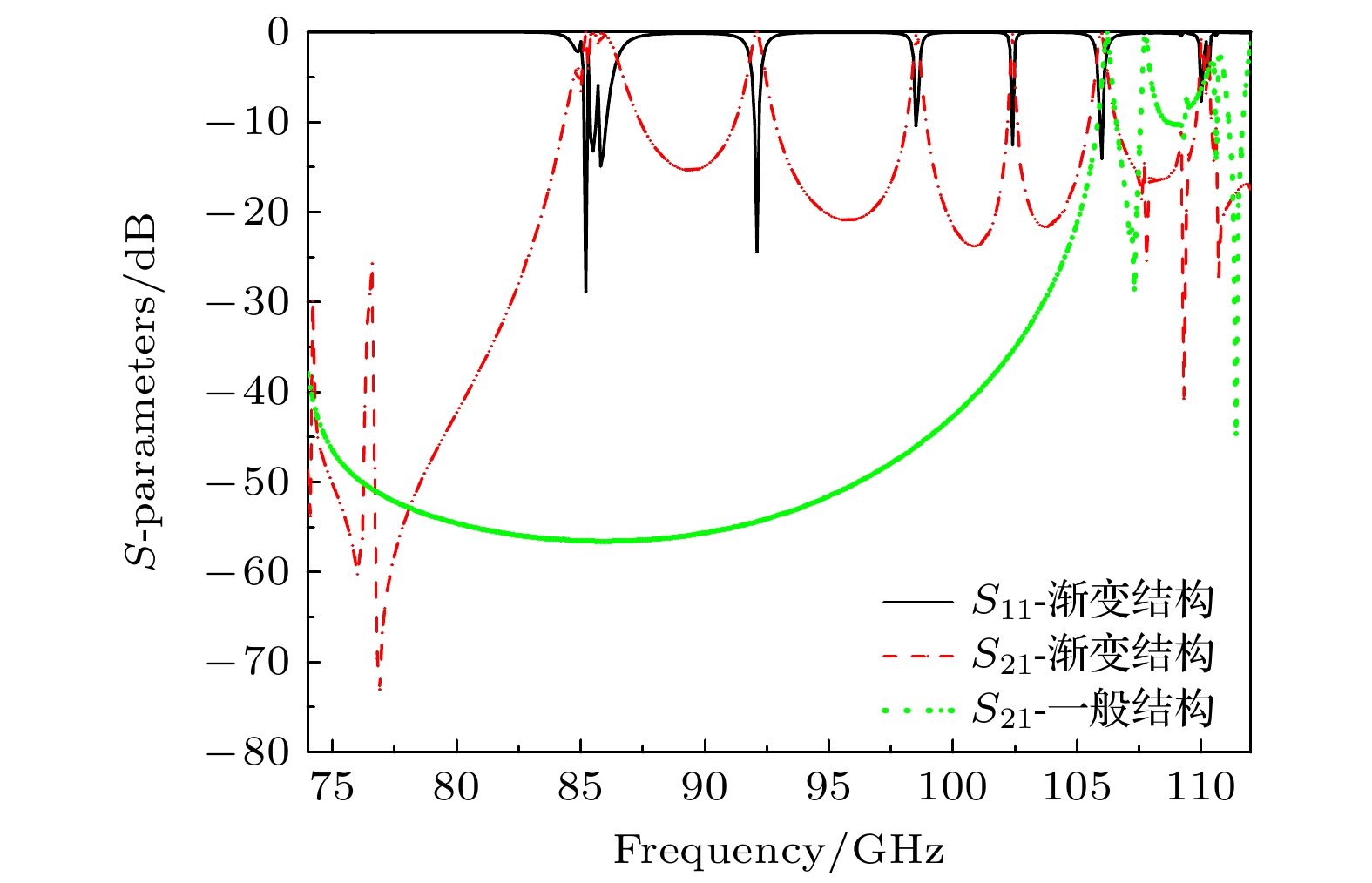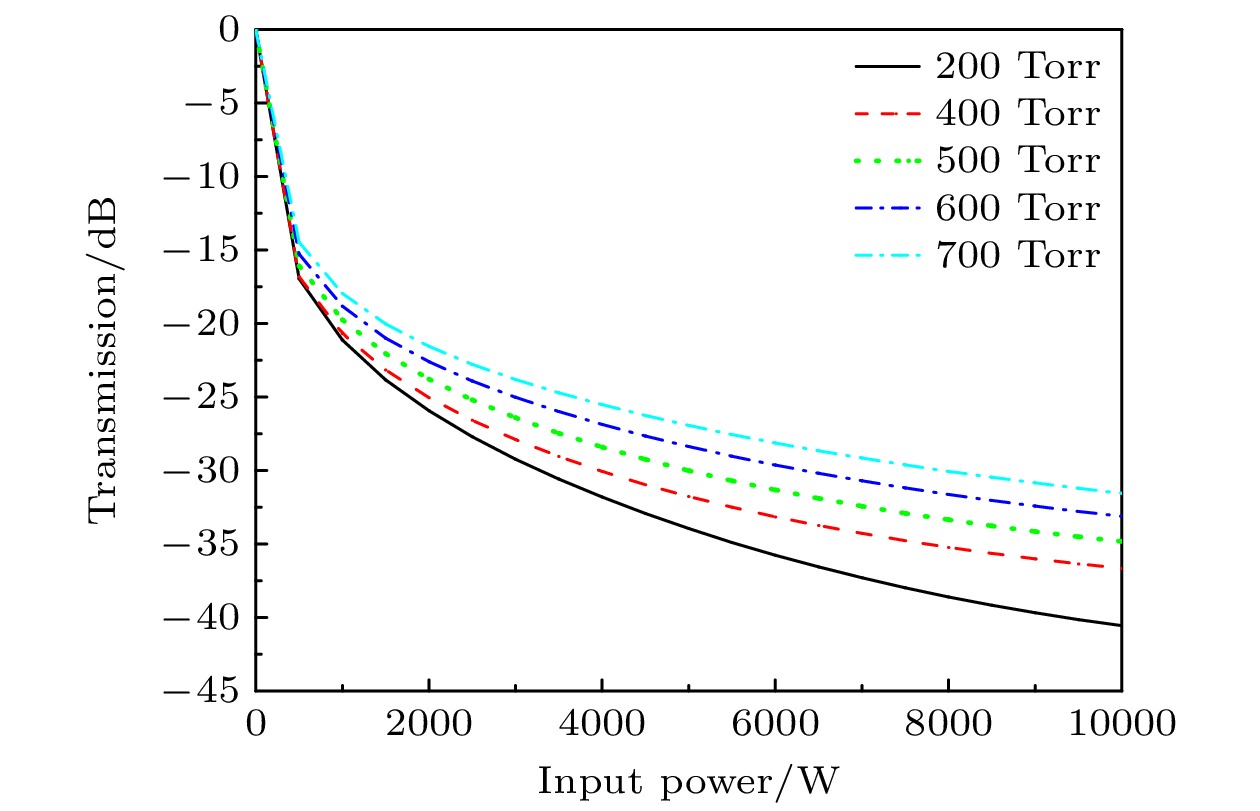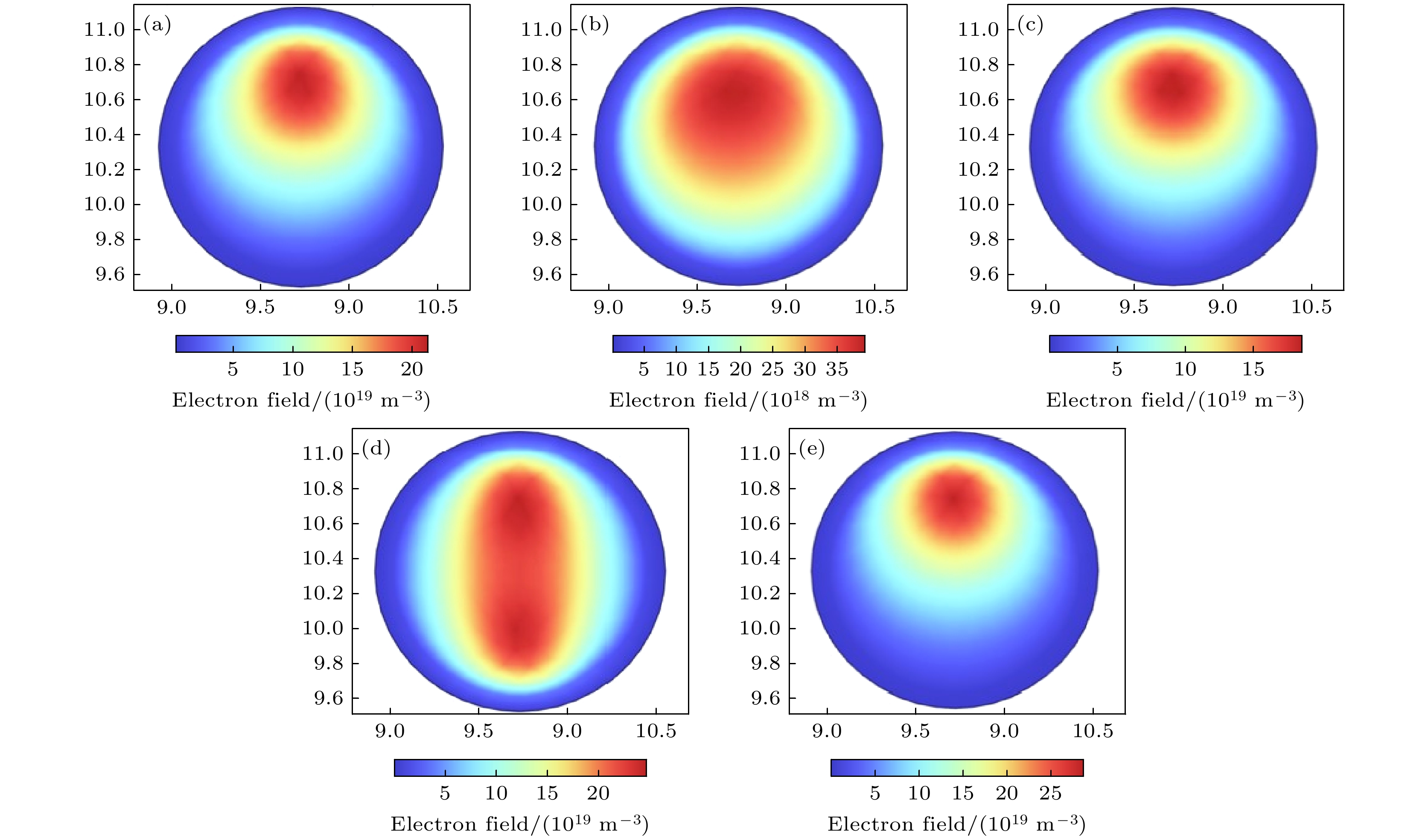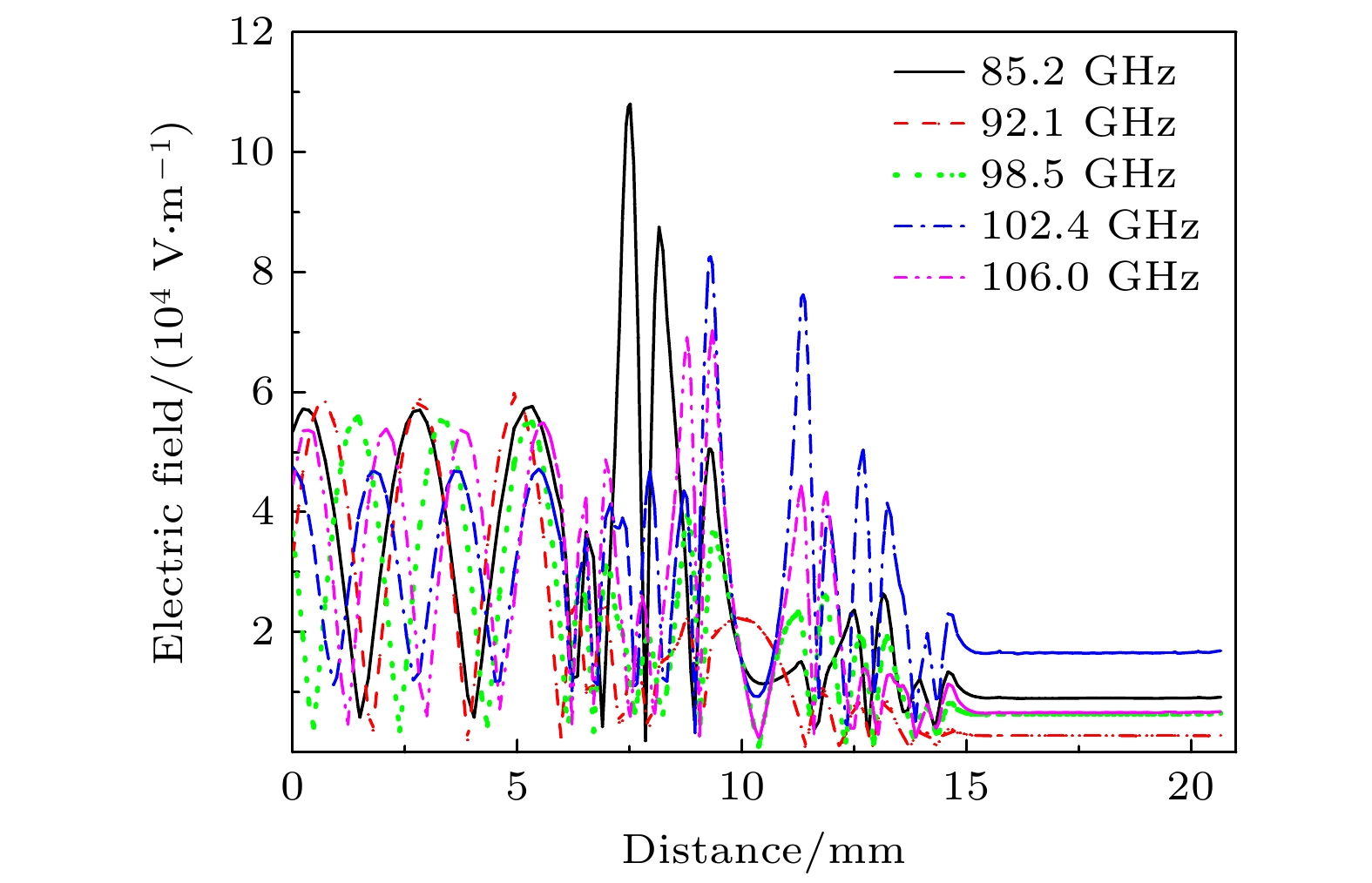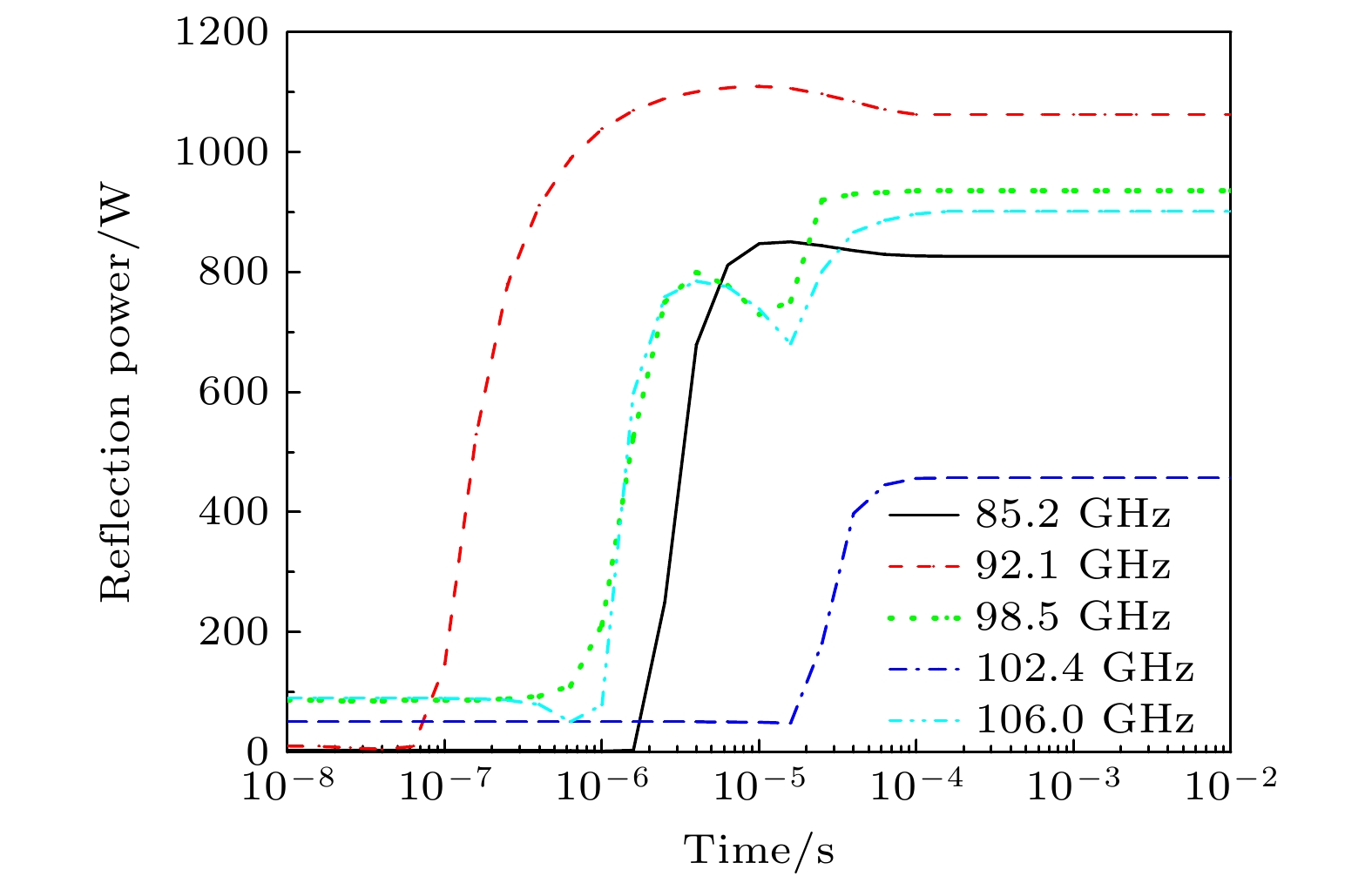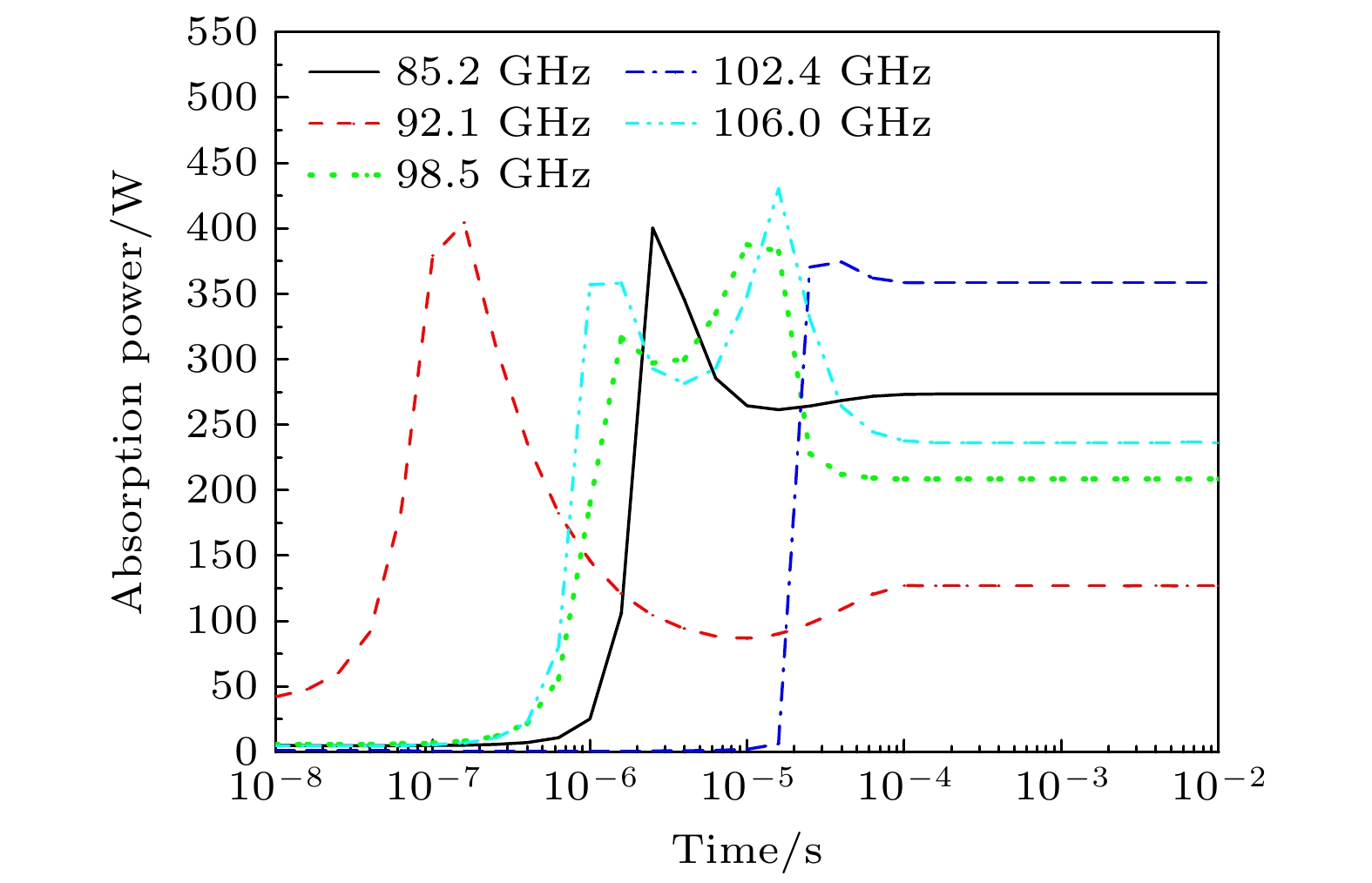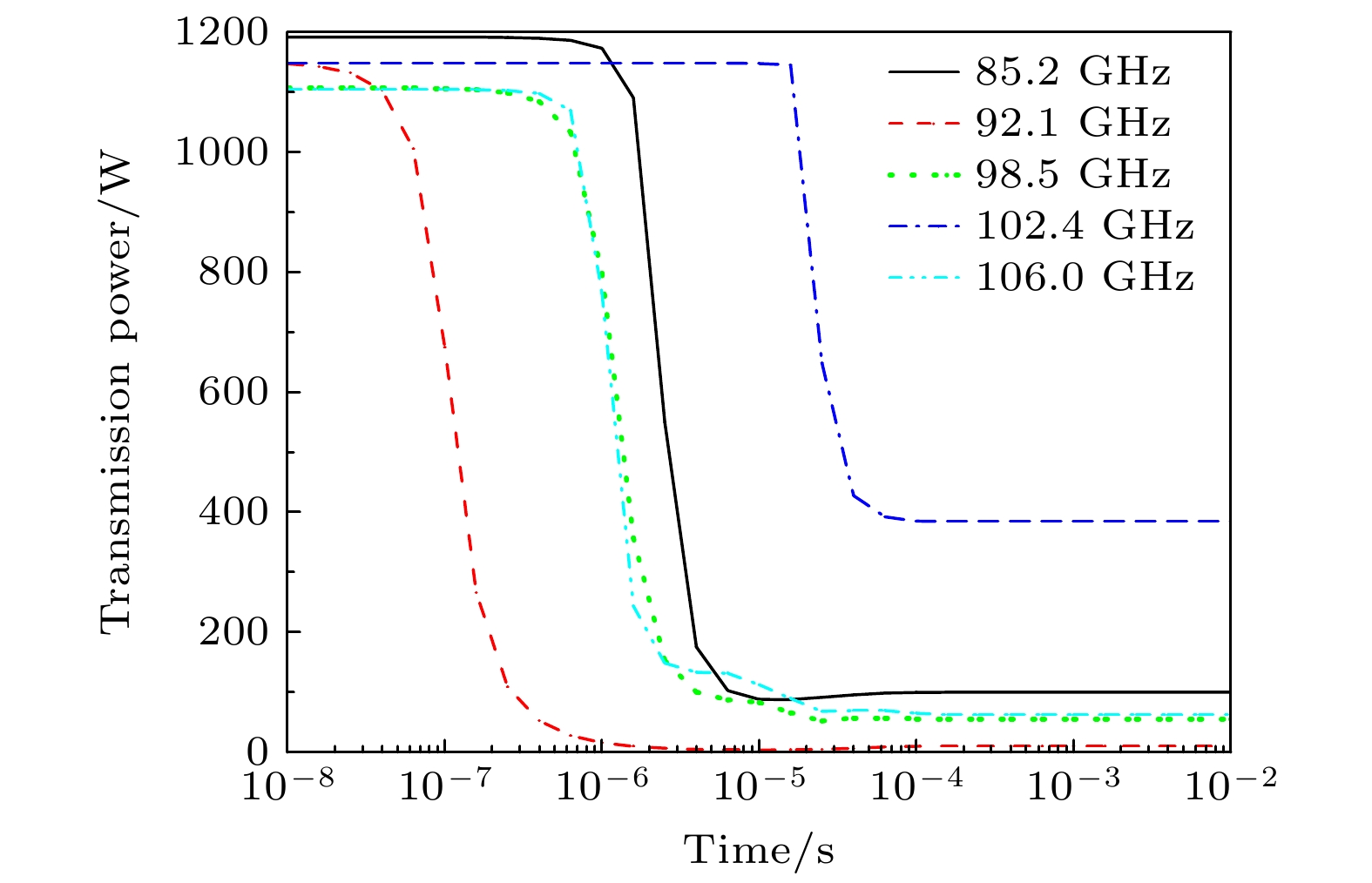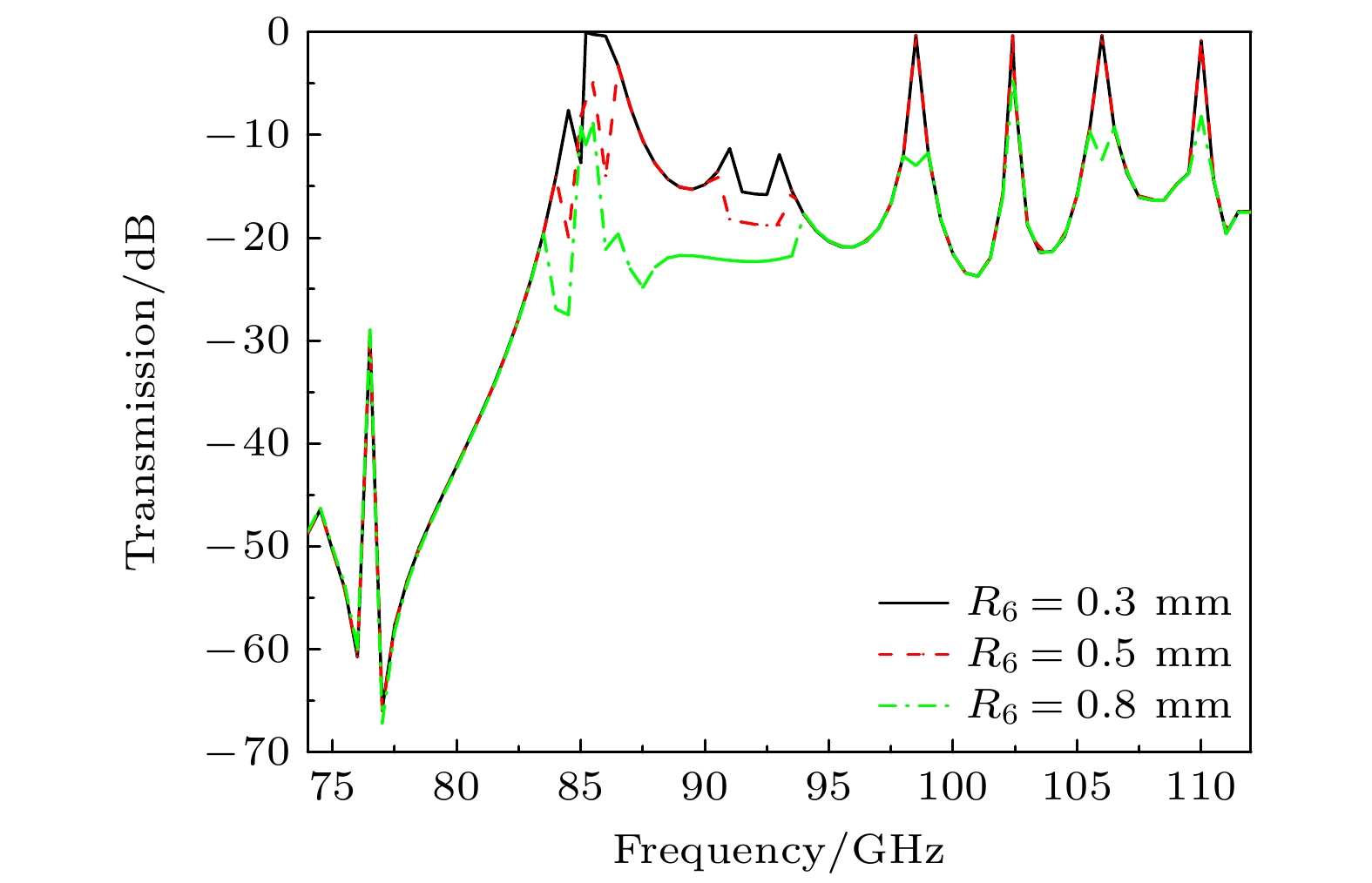-
为进一步研究光子晶体对电磁波传输的影响, 提出了等离子体光子晶体阵列结构波导模型, 以期能够实现对电磁波的传输调控. 该模型结构能够在W波段实现多频点高效传输, 在缺陷空位中心处加入等离子体柱后能够对电磁波进行限幅. 通过改变渐变结构参数、等离子体参数等因素可调控电磁波的传输效果. 研究结果表明, 电磁波在无等离子体干扰的情况下, 能实现85.2, 92.1, 98.5, 102.4, 106 GHz等多个频点的高效传输, 其传输系数均大于-0.42 dB. 构造的渐变结构能够使在谐振频率下缺陷空位周围形成不同的强电场, 致使气体击穿产生高浓度微波等离子体, 实现对电磁波的反射功率、传输功率和吸收功率的有效调控. 此外, 改变等离子体柱的尺寸大小, 可以进一步调节电磁波在不同频点下的传输特性. 该研究能够为高频电磁波的传输与微波器件的设计提供支撑依据.Photonic crystal with periodic dielectric constant distribution has become the focus of theoretical and applied research in recent years because of their bandgap structure similar to the electronic states in semiconductors. It is also a promising method of creating a stable low power microplasma. This research field makes it possible to explore plasma science using microplasmas driven by millimeter wave bands. The dispersive and dissipative properties of plasma make plasma photonic crystals have properties that conventional dielectric photonic crystals do not have. The properties and parameters of plasma photonic crystal can be artificially controlled by changing the parameters of the plasma. To further investigate the influence of photonic crystals on electromagnetic wave transmission, a waveguide model with a plasma photonic crystal array structure is proposed in order to achieve modulation of electromagnetic wave transmission. This proposed model structure can achieve multiple frequency transmission points, making up for the shortcoming of single frequency point transmission in the W-band. Meanwhile, adding a plasma column to the center of defect vacancy in the gradient structure can limit the amplitude of electromagnetic waves and regulate the transmission of electromagnetic waves at different resonant frequencies. The results show that electromagnetic wave can achieve efficient transmission at multiple frequency points such as 85.2, 92.1, 98.5, 102.4, 106 GHz without plasma interference, and transmission coefficients are greater than –0.42 dB. The construction of gradient structure can form different strong electric fields around the defect vacancy at the resonance frequency, resulting in gas breakdown and the generation of high-concentration microwave plasma, achieving effective control of the reflected power, transmitted power and absorbed power of electromagnetic wave. When the plasma concentration reaches the plasma frequency equivalent to the incident wave frequency, the electromagnetic wave can be transmitted with less loss in this period. When it achieves a considerable degree or higher, the electromagnetic wave will be rapidly absorbed or reflected by the high concentration plasma, and the transmission power will decrease rapidly, and finally stabilize at a low level. In addition, changing the size of the plasma column can further adjust the transmission characteristics of electromagnetic waves at different frequency points. This research can provide support for the transmission of high-frequency electromagnetic waves and the design of microwave devices.
-
Keywords:
- plasma /
- electromagnetic wave /
- graded structure /
- gas breakdown
[1] Yablonovitch E 1987 Phys. Rev. Lett. 58 2059
 Google Scholar
Google Scholar
[2] Bai W C, Li B H, Zhou B H, Zhao D, Lan Z J, Zhang H, Zhang H Z, Yuan L 2021 Solid State Commun. 324 114143
 Google Scholar
Google Scholar
[3] Berman O L, Boyko V S, Kezerashvili R Y, Kolesnikov A A, Lozovik Y E 2018 Phys. Lett. A 382 2075
 Google Scholar
Google Scholar
[4] 周金苟, 杜桂强, 张亚文, 刘念华 2005 54 3703
 Google Scholar
Google Scholar
Zhou J G, Du G Q, Zhang Y W, Liu N H 2005 Acta Phys. Sin. 54 3703
 Google Scholar
Google Scholar
[5] Moghadam F R, Bahari A 2017 J. Mod. Opt. 64 567
 Google Scholar
Google Scholar
[6] Wang H L, Li J F, Guo L, Ma D L, Yao J F, Li H P 2023 Photonics 10 333
 Google Scholar
Google Scholar
[7] Britto E C, Danasegaran S K, Xavier S C, Lalithakumari S 2023 J. Electron. Mater. 52 1177
 Google Scholar
Google Scholar
[8] 张戎, 曹俊诚 2010 59 3924
 Google Scholar
Google Scholar
Zhang R, Cao J C 2010 Acta Phys. Sin. 59 3924
 Google Scholar
Google Scholar
[9] Kumar A, Singh P, Thapa K B 2020 Opt. Quantum Electron. 52 423
 Google Scholar
Google Scholar
[10] Zhu Q F, Wang D Y, Zhang Y 2011 Optik 122 330
 Google Scholar
Google Scholar
[11] Chaves F S, Posada H V, Barón E P N 2020 Optik 200 163320
 Google Scholar
Google Scholar
[12] Centeno E, Cassagne D 2005 Opt. Lett. 30 2278
 Google Scholar
Google Scholar
[13] Singh B K, Bambole V, Tiwari S, Shukla K K, Pandey P C, Rastogi V 2021 Optik 240 166854
 Google Scholar
Google Scholar
[14] Zhu Z C, Liu B, Zhang F, Tang H L, Xu J, Gu M, Zhang C, Chen L, Liu J L, Ouyang X P 2021 Opt. Express 29 18646
 Google Scholar
Google Scholar
[15] Hojo H, Mase A 2004 J. Plasma Fusion Res. 80 89
 Google Scholar
Google Scholar
[16] Lo J, Sokoloff J, Callegari T, Boeuf J P 2010 Appl. Phys. Lett. 96 251501
 Google Scholar
Google Scholar
[17] Gregório J, Parsons S, Hopwood J 2017 Plasma Sources Sci. Technol. 26 02LT03
 Google Scholar
Google Scholar
[18] Biggs D R, Marcovati A, Cappelli M A 2019 J. Phys. D: Appl. Phys. 52 055202
 Google Scholar
Google Scholar
[19] Sakai O, Sakaguchi T, Tachibana K 2005 Appl. Phys. Lett. 87 241505
 Google Scholar
Google Scholar
[20] Hopwood J 2021 Plasma Sources Sci. Technol. 30 115013
 Google Scholar
Google Scholar
[21] Liu R B, Peng J, Lin L G, Qiu D Q, Liu Z, Lin Q 2023 Phys. Scr. 98 055611
 Google Scholar
Google Scholar
[22] Liang Y C, Liang Z Q, Liu Z, Jun P, Qiu D Q 2023 Opt. Express 31 776
 Google Scholar
Google Scholar
[23] Wang S, Liu S, Hou X H, Liu F C, Wu Z C, He Y F, Fan W L 2024 Phys. Lett. A 525 129850
 Google Scholar
Google Scholar
[24] Sun P P, Zhang R Y, Chen W Y, Braun P V, Eden J G 2019 Appl. Phys. Rev. 6 041406
 Google Scholar
Google Scholar
[25] 刘少斌, 朱传喜, 袁乃昌 2005 54 2804
 Google Scholar
Google Scholar
Liu S B, Zhu C X, Yuan N C 2005 Acta Phys. Sin. 54 2804
 Google Scholar
Google Scholar
[26] Kamboj G K, Yadav R P, Kaler R S 2021 Phys. Plasma 28 53509
 Google Scholar
Google Scholar
[27] Li J F, Zhou C, Yao J F, Yuan C X, Wang Y, Zhou Z X, Zhang J W, Kudryavtsev A A 2023 Plasma Sci. Technol. 25 35001
 Google Scholar
Google Scholar
[28] Parsons S G, Hopwood J 2017 IEEE Electron Device Lett. 38 1602
 Google Scholar
Google Scholar
[29] Kim H, Hopwood J 2020 J. Appl. Phys. 128 93302
 Google Scholar
Google Scholar
[30] Navarro R, Hopwood J 2022 J. Appl. Phys. 132 103301
 Google Scholar
Google Scholar
[31] Hopwood J 2023 IEEE Trans. Plasma Sci. 51 2165
 Google Scholar
Google Scholar
[32] Liao C J, Wang L, Gao J W, Ding D Z 2024 IEEE Trans. Plasma Sci. 52 204
 Google Scholar
Google Scholar
[33] Wang L, Bao H G, Ding D Z, Chen R S 2022 IEEE Trans. Plasma Sci. 50 525
 Google Scholar
Google Scholar
[34] Zhao P C, Liao C, Lin W B, Chang L, Fu H J 2011 Phys. Plasmas 18 102111
 Google Scholar
Google Scholar
[35] Datta S, Han J G, Kumar R, Sahu B B 2024 AIP Adv. 14 015046
 Google Scholar
Google Scholar
[36] Kim H, Hopwood J 2021 J. Appl. Phys. 129 033301
 Google Scholar
Google Scholar
-
图 6 t = 0.01 s时刻渐变结构缺陷空位处加入等离子体柱后不同频点下的电场分布 (a) 85.2 GHz; (b) 92.1 GHz; (c) 98.5 GHz; (d) 102.4 GHz; (e) 106 GHz
Fig. 6. Electric field distribution at different frequency points after the plasma column is added to the vacancy of the defect in the gradient structure at t = 0.01 s: (a) 85.2 GHz; (b) 92.1 GHz; (c) 98.5 GHz; (d) 102.4 GHz; (e) 106 GHz.
图 7 t = 0.01 s 时刻渐变结构缺陷空位处加入等离子体柱后不同频点下的电子密度分布 (a) 85.2 GHz; (b) 92.1 GHz; (c) 98.5 GHz; (d) 102.4 GHz; (e) 106 GHz
Fig. 7. Electron density distribution at different frequency points after the plasma column is added to the vacancy of the defect in the gradient structure at t = 0.01 s: (a) 85.2 GHz; (b) 92.1 GHz; (c) 98.5 GHz; (d) 102.4 GHz; (e) 106 GHz.
-
[1] Yablonovitch E 1987 Phys. Rev. Lett. 58 2059
 Google Scholar
Google Scholar
[2] Bai W C, Li B H, Zhou B H, Zhao D, Lan Z J, Zhang H, Zhang H Z, Yuan L 2021 Solid State Commun. 324 114143
 Google Scholar
Google Scholar
[3] Berman O L, Boyko V S, Kezerashvili R Y, Kolesnikov A A, Lozovik Y E 2018 Phys. Lett. A 382 2075
 Google Scholar
Google Scholar
[4] 周金苟, 杜桂强, 张亚文, 刘念华 2005 54 3703
 Google Scholar
Google Scholar
Zhou J G, Du G Q, Zhang Y W, Liu N H 2005 Acta Phys. Sin. 54 3703
 Google Scholar
Google Scholar
[5] Moghadam F R, Bahari A 2017 J. Mod. Opt. 64 567
 Google Scholar
Google Scholar
[6] Wang H L, Li J F, Guo L, Ma D L, Yao J F, Li H P 2023 Photonics 10 333
 Google Scholar
Google Scholar
[7] Britto E C, Danasegaran S K, Xavier S C, Lalithakumari S 2023 J. Electron. Mater. 52 1177
 Google Scholar
Google Scholar
[8] 张戎, 曹俊诚 2010 59 3924
 Google Scholar
Google Scholar
Zhang R, Cao J C 2010 Acta Phys. Sin. 59 3924
 Google Scholar
Google Scholar
[9] Kumar A, Singh P, Thapa K B 2020 Opt. Quantum Electron. 52 423
 Google Scholar
Google Scholar
[10] Zhu Q F, Wang D Y, Zhang Y 2011 Optik 122 330
 Google Scholar
Google Scholar
[11] Chaves F S, Posada H V, Barón E P N 2020 Optik 200 163320
 Google Scholar
Google Scholar
[12] Centeno E, Cassagne D 2005 Opt. Lett. 30 2278
 Google Scholar
Google Scholar
[13] Singh B K, Bambole V, Tiwari S, Shukla K K, Pandey P C, Rastogi V 2021 Optik 240 166854
 Google Scholar
Google Scholar
[14] Zhu Z C, Liu B, Zhang F, Tang H L, Xu J, Gu M, Zhang C, Chen L, Liu J L, Ouyang X P 2021 Opt. Express 29 18646
 Google Scholar
Google Scholar
[15] Hojo H, Mase A 2004 J. Plasma Fusion Res. 80 89
 Google Scholar
Google Scholar
[16] Lo J, Sokoloff J, Callegari T, Boeuf J P 2010 Appl. Phys. Lett. 96 251501
 Google Scholar
Google Scholar
[17] Gregório J, Parsons S, Hopwood J 2017 Plasma Sources Sci. Technol. 26 02LT03
 Google Scholar
Google Scholar
[18] Biggs D R, Marcovati A, Cappelli M A 2019 J. Phys. D: Appl. Phys. 52 055202
 Google Scholar
Google Scholar
[19] Sakai O, Sakaguchi T, Tachibana K 2005 Appl. Phys. Lett. 87 241505
 Google Scholar
Google Scholar
[20] Hopwood J 2021 Plasma Sources Sci. Technol. 30 115013
 Google Scholar
Google Scholar
[21] Liu R B, Peng J, Lin L G, Qiu D Q, Liu Z, Lin Q 2023 Phys. Scr. 98 055611
 Google Scholar
Google Scholar
[22] Liang Y C, Liang Z Q, Liu Z, Jun P, Qiu D Q 2023 Opt. Express 31 776
 Google Scholar
Google Scholar
[23] Wang S, Liu S, Hou X H, Liu F C, Wu Z C, He Y F, Fan W L 2024 Phys. Lett. A 525 129850
 Google Scholar
Google Scholar
[24] Sun P P, Zhang R Y, Chen W Y, Braun P V, Eden J G 2019 Appl. Phys. Rev. 6 041406
 Google Scholar
Google Scholar
[25] 刘少斌, 朱传喜, 袁乃昌 2005 54 2804
 Google Scholar
Google Scholar
Liu S B, Zhu C X, Yuan N C 2005 Acta Phys. Sin. 54 2804
 Google Scholar
Google Scholar
[26] Kamboj G K, Yadav R P, Kaler R S 2021 Phys. Plasma 28 53509
 Google Scholar
Google Scholar
[27] Li J F, Zhou C, Yao J F, Yuan C X, Wang Y, Zhou Z X, Zhang J W, Kudryavtsev A A 2023 Plasma Sci. Technol. 25 35001
 Google Scholar
Google Scholar
[28] Parsons S G, Hopwood J 2017 IEEE Electron Device Lett. 38 1602
 Google Scholar
Google Scholar
[29] Kim H, Hopwood J 2020 J. Appl. Phys. 128 93302
 Google Scholar
Google Scholar
[30] Navarro R, Hopwood J 2022 J. Appl. Phys. 132 103301
 Google Scholar
Google Scholar
[31] Hopwood J 2023 IEEE Trans. Plasma Sci. 51 2165
 Google Scholar
Google Scholar
[32] Liao C J, Wang L, Gao J W, Ding D Z 2024 IEEE Trans. Plasma Sci. 52 204
 Google Scholar
Google Scholar
[33] Wang L, Bao H G, Ding D Z, Chen R S 2022 IEEE Trans. Plasma Sci. 50 525
 Google Scholar
Google Scholar
[34] Zhao P C, Liao C, Lin W B, Chang L, Fu H J 2011 Phys. Plasmas 18 102111
 Google Scholar
Google Scholar
[35] Datta S, Han J G, Kumar R, Sahu B B 2024 AIP Adv. 14 015046
 Google Scholar
Google Scholar
[36] Kim H, Hopwood J 2021 J. Appl. Phys. 129 033301
 Google Scholar
Google Scholar
计量
- 文章访问数: 2222
- PDF下载量: 78
- 被引次数: 0













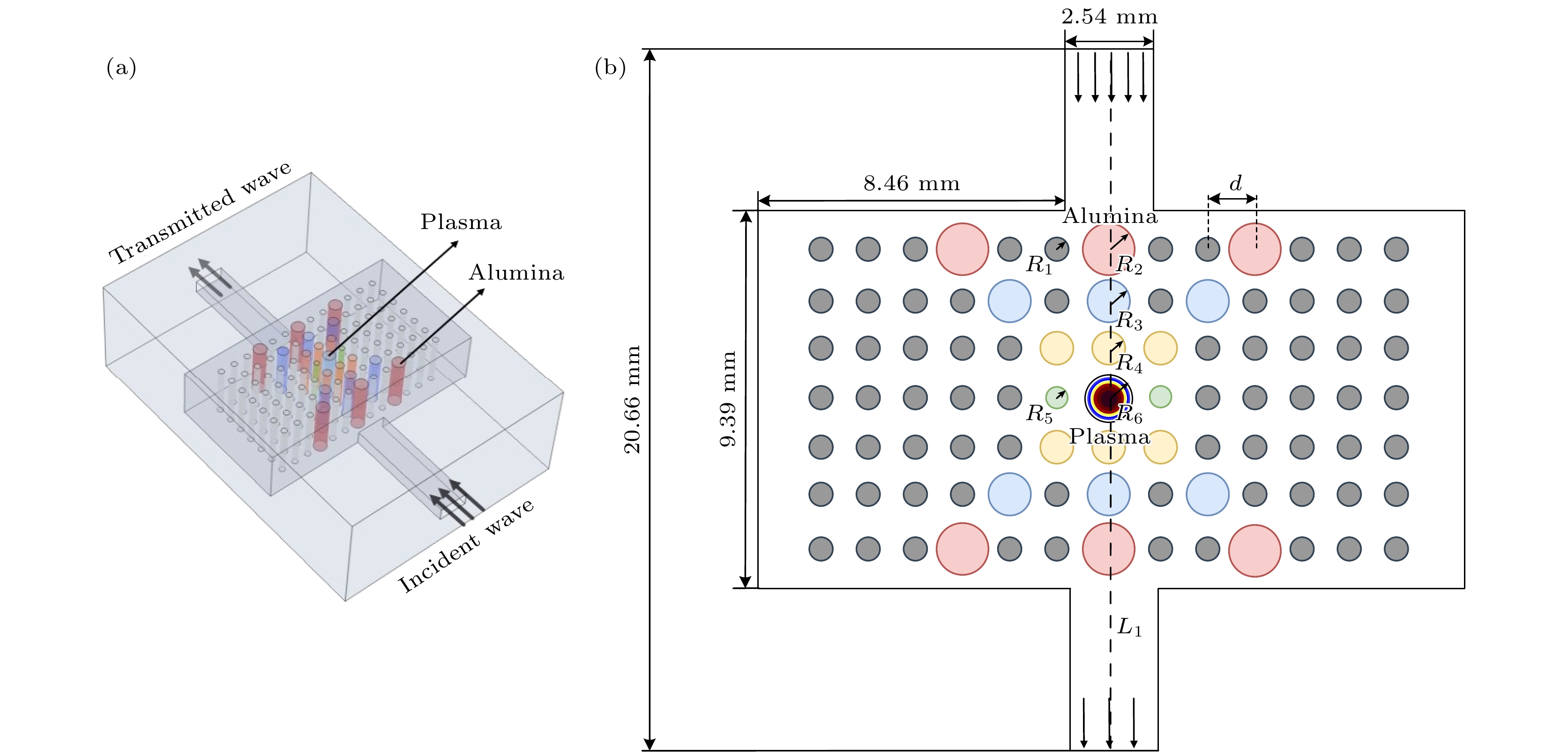
 下载:
下载:
